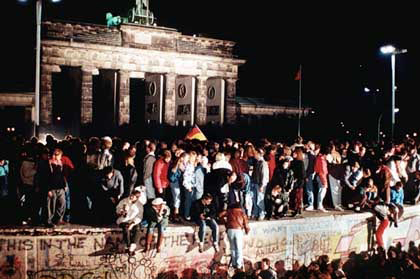|
|
|
||
| home | table of contents |feature | record reviews | live shows | news | events |archive | record label | links | contact | ||
|
It
was 1986 and The Fur Bible
had come to its demise and I was hanging around in
London at this houseboat in Chelsea with these girls – these
two sisters. It was a central place where people were meeting
up. A lot of bands were staying there like Einsturzende
Neubauten and Nick
Cave and the Bad Seeds - and different people would
float through. It was a place where people congregated a lot and
stayed. There were a lot of parties. And I was there one day with
Mick
Harvey and he told me that the Bad Seeds were looking
for a guitar player. Barry
Adamson wasn’t going to go on tour with them
– so he was going to play bass and they were looking for
a guitar player. And he asked me if I was interested to do it.
I thought it was a really great idea because I was a big fan and
I’d known Nick for a long time – known him since The
Birthday Party – and Mick as well. So I was
glad to accept his invitation.
And
it was really really cool to see Wim Wenders and watch him working
because he is like one of his films. He’s really slow moving
and really thoughtful about everything – a calm, observant
type of person. He actually came up to me - he was directing us
- and said, “Oh… Kid Congo – I’ve seen
you before. I saw The
Gun Club a bunch of times. I saw you at the Club
Lingerie in Los Angeles…” And I was really impressed. In Berlin, By the Wall
So
when I got to Berlin I really felt like, “Wow, I’m
going to unbutton my shirt.” I didn’t speak the language.
I’d been to Berlin to play but I never really spent any
time there. And I immediately felt really at home and the atmosphere
there was really strange. And I could see why Nick Cave and the
Bad Seeds had staked a home there. It was a place where I found
that everything really met up with each other – the film
world met up with the rock world met up with the dance world met
up with the visual arts – people would do things together.
And this was some years before the divided wall came down between
East and West Berlin. So it was just West Berlin I was in. And
so there was also that special feeling of some kind of isolation
because you were just surrounded by Eastern Europe – East
Germany. And you really got the feeling that you were in a really
special place.
My bandleader there was more Mick Harvey than anyone - who would show me how stuff goes and what the timings were. The other thing was that there was really a lot of freedom in what was going on. Everyone’s individual ideas were welcomed in that band and that’s what I think Nick really wanted – that’s why he chose such individuals to be in his band. And that’s very much the same as - Jeffrey chose me because he just met me and I didn’t play anything, The Cramps chose me because I seemed to fit some kind of sort of strange idea that they had, and the same thing with Nick Cave and the Bad Seeds – that they were looking for something that wasn’t what everyone else was doing and that’s who they chose to be in their band.
We were doing a lot of touring and I took up residence in Berlin. I got there and decided, “I want tolive here.” I was offered a place. I met Maria Zastrow – who was the bartender at Risiko. Somehow it reminded me a little of New York – somehow - I don’t know why - maybe because it was so cosmopolitan in a weird way. Or rather, the people I was with were cosmopolitan. And next to London, it seemed like somewhere I could call home. And I ended up there in Berlin for three years without any desire to leave. Nick was really working hard at the time on his book And the Ass Saw the Angel. So he really just made music and wrote that book. I didn’t really hang out with Nick so much. I mean I knew him well and obviously we toured together. At that point I knew Anita much better and Mick Harvey and Thomas and Roland Wolf. Actually me and the keyboard player Roland Wolf were the new guys in the band and so we bonded on that kind of level – we weren’t sure what we were doing there but made our way in. Everyone else was just going along with what they’d been doing. Berlin at the time was full of speed and drugs. That (Tender Prey) is a very druggy sort of record. I know Mick and Nick refer to it as a really black period in their lives. There was a lot of heaviness going on – mostly do to probably drug-taking – just life was very heavy at the time with relationships with different people. And there was a big influx of Australians moving there in the Bad Seeds path – Crime and the City Solution and just different people. A lot of Australian groups were moving to Berlin at the time because, like now, then, it was an even cheaper place to live and very free with the music process. I’d just come from London where it was all about success in the music industry and getting your picture in the paper and being on the latest trend and that was really the opposite.
And I found that, touring with Nick Cave and the Bad Seeds, that they had some very dedicated, overzealous fans. The band was really popular but I could see that it was going to go really really popular. The dedication to, and obsession with, Nick, especially, I was pretty astonished at - to the point of stalking, threats of suicide, just really crazy crazy fans. So
I stayed in Berlin for like three years and this time me and Jeffrey
were keeping in contact and we started up The Gun Club again.
So I was really on the go. I was doing back-to-back tours really
a lot. My last year in Berlin especially I was hardly there because
I just on tour the whole time
And at this time we went to Brazil to play and it was about this time Nick met a girl who was to be the mother of his child. He was really taken with Brazil – as we all were. So we decided – Nick decided – that it would actually turn out to be cheaper to get a studio in Brazil, and fly us all out there and stay there to record an album. So we went to Sao Paulo and stayed for three weeks making The Good Son – tracking it all. And that was a great time. A great experience. I was sober and I was excited about making a record again.
Victor (Van Vugt) went with us. Victor had been doing our live sound for a really long time. Tony had been doing it. He was a kind of crazy sort of guy. Then he went back to Australia and Victor stepped in on that American tour - because he’s in that documentary. Making
The Good Son – I really feel like that’s
some of the best guitar stuff I did. Even though it seems really
minimal, I think I started learning to play again. It was a very
piano-led kind of record - so the harsh guitars are at a minimum
but they’re still there. It was a real transition from that
harsh Berlin sound into something - whatever needs to become at
the time. It was kind of strange, when we were recording, we didn’t
really notice it was any different than any other record we were
making. I kind of had a little bit of a return to a kind of Gun
Club-y sort of style of playing - melodies and rhythm and things
instead of seeing what jagged edge I could put into the songs
- a lot of acoustical guitar – which Mick Harvey played
all of – because I don’t want to play an acoustic
guitar. ...And the Walls Came Tumbling Down
We returned from Brazil to mix the album in Berlin and when we were mixing the album, the Berlin Wall came down. It was a really funny run-up to the whole thing because the TV was on and my German’s really not that great. Blixa and Thomas kept running in saying that “so-and-so resigned from the East German cabinet.” And then they were saying, “And then the president resigned... And now the vice president resigned… And now there’s nobody there!” And they were saying that people were coming through the wall. I remember we came out at six in the morning or something and there were all of these people wandering around and people asking us if they could stay with us because no one knew what was going on. They didn’t know if they were going to be taken back. They didn’t know if it was permanent or whatever. And then the next day I woke up to go to the studio and I was like, “Wow, it seems like a lot of people here.” There were a gazillion people in acid-washed genes in all of the train stations and everywhere you were there were just crazy people. And you realized that “Wow! People are coming through.” It was a really crazy crazy time. It was like a circus. We
were at Tritonus studio - which was actually near one of the borders.
So there were a lot of people coming through there. And it was
an exciting time. I remember that it was our friend Maria’s
(Zastrow) birthday the very night of the first night. And she
was having a birthday party at her house and I remember she arrived
going, “ Look, I brought some East people with me. They’re
from the East! Give ‘em a drink!” So I’ll always
remember the event by the mixing of The Good Son. One More Man Gone A lot of things were changing in The Bad Seeds and in people’s personal lives – in my personal life. I was changing. We were all going through changes because we all got clean. With that comes a different viewpoint. You can start to reassess what you want to do and follow different desires. And, as it turned out, Nick had fallen in love with a Brazilian girl. So his relationship with Anita ended. And that was a traumatic thing. I had to bear witness to it because I was living in the same house. Whatever – that’s they’re personal thing and not very much of my concern. But that was one event… I had a real desire to move back to the United States. I was going to move to either San Francisco or New York. But then I went to LA and got involved in a love affair and decided, “I’ll move to LA.” And that was over in six months and I was stuck there for a while. So then I was deciding, “OK maybe I’m going to move to Los Angeles.” I was staying there a lot and I was really getting busy with The Gun Club. And
Nick just called me and said that they were trying to figure out
what to do about touring for the record or stuff. And they were
trying to figure out if they needed all the people. Because I
was changing so much and bent on moving to Los Angeles, it didn’t
seem like a bad idea for me not to do the tour – not to
be in the band. Because I for one had only joined to do one tour
and ended up there for three years. And I was also having a real
desire to do something on my own and something different again.
You’ll see through these interviews that there’s a
three-year cycle of my attention span with one project and obviously
other people’s attention spans with me. He just said, “What
do you think?” And I said, “I think maybe it’s
a good idea I stay in Los Angeles then and just work on the Gun
Club,” who were increasingly more busy. “And if you
can’t justify having two experimental guitarists in a not-so-experimental
band anymore, then maybe that’s a good thing.” Once
again, Mick Harvey was going to change to be the guitarist. And
so they went. Actually it was a very amicable split because I
felt like I was kind of through and done what I could do with
them and I could see that I wasn’t really needed and I was
quite busy enough with my band with Jeffrey. And so that was kind
of the end of that.
New York Night Train would like to thank Hans from Nick Cave site From The Archives for his amazing photos.
Kid
Congo Powers Pt 2 home page | Kid
Congo Powers Oral History table of contents
© New York Night Train , 2005
|
||
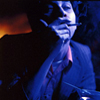
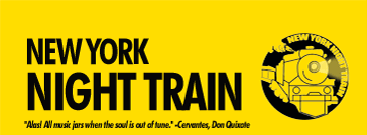
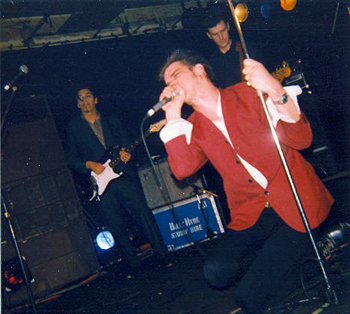
 So
I got on a plane to Berlin and started rehearsing for the tour.
And right before the tour we were going to film for the
So
I got on a plane to Berlin and started rehearsing for the tour.
And right before the tour we were going to film for the  It
was really great to land in Berlin too because I’d been
in London for a year or longer. And the whole experience was a
bit oppressive in London – just coming from America to there
– the whole way of life and structure of the culture. It
made me start to feel really kind of crushed under foot or something.
I really felt like I was not myself somehow. I felt like I talked
too loud. I was weird. People thought I was Pakistani all the
time. I really felt racism for the first time in my life. Although
I had great friends there and had a good time, in the long term
I still was not down with the whole cultural structure and class
systems and racism and different things. And, like I said before,
I wasn’t really into this pop culture – having to
have the new thing happen every ten minutes the new pop sensation
every ten minutes – and the new style of music and the new
look and the new everything.
It
was really great to land in Berlin too because I’d been
in London for a year or longer. And the whole experience was a
bit oppressive in London – just coming from America to there
– the whole way of life and structure of the culture. It
made me start to feel really kind of crushed under foot or something.
I really felt like I was not myself somehow. I felt like I talked
too loud. I was weird. People thought I was Pakistani all the
time. I really felt racism for the first time in my life. Although
I had great friends there and had a good time, in the long term
I still was not down with the whole cultural structure and class
systems and racism and different things. And, like I said before,
I wasn’t really into this pop culture – having to
have the new thing happen every ten minutes the new pop sensation
every ten minutes – and the new style of music and the new
look and the new everything. 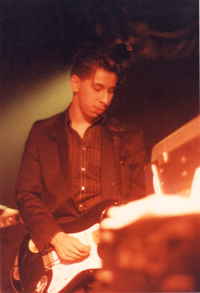 And
so we went on the
And
so we went on the 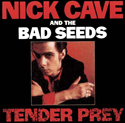 The
creative process with the Bad Seeds seemed to be very different
and unpredictable. Usually it started out with drums, maybe piano
or a guitar part that Nick or Mick would come up with. Then me
and
The
creative process with the Bad Seeds seemed to be very different
and unpredictable. Usually it started out with drums, maybe piano
or a guitar part that Nick or Mick would come up with. Then me
and 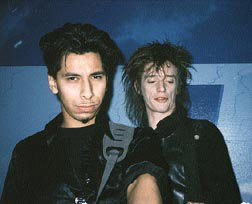 Definitely
Definitely
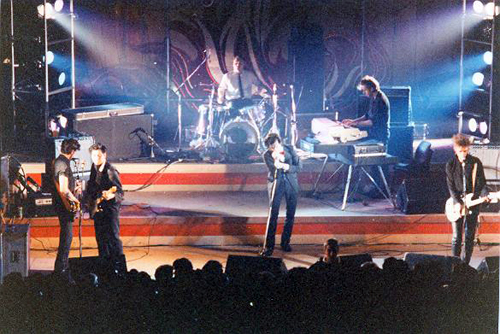
 After
Tender Prey came out we were doing a lot of touring.
Nick Cave and the Bad Seeds are very much a live touring kind
of band – always have been and still are. We toured all
over the world: Australia, Japan, all of Europe, America. On the
American tour the film crew came and made the documentary
After
Tender Prey came out we were doing a lot of touring.
Nick Cave and the Bad Seeds are very much a live touring kind
of band – always have been and still are. We toured all
over the world: Australia, Japan, all of Europe, America. On the
American tour the film crew came and made the documentary  The
Bad Seeds went to Brazil to play. Nick really fell in love with
Brazil and he fell in love with a girl in Brazil. By this time
I’d actually moved back to London. Mick and Nick had moved
back to London and I followed suit and got a house with Nick and
Anita in Cobham Common. There we had a three-story house and in
the attic there was a piano where he wrote all of the songs for
The Good Son. This time we left Berlin because drugs
had really taken their toll and we really wanted out. Nick and
Anita had gone to rehab and I had started going to NA meetings
and stopped taking drugs and started to get myself together because
by the end of Berlin, even though this was the height of the most
popular thing I’d done, I’d really lost interest.
I was no longer excited about music. I’d turned to stone.
That’s what heroin does to you. People were overdosing and
dying in the scene and I was seeing that people didn’t care
about it and I had this crazy moment of like, “This is so
fucked up and this is not me. I was this crazy music fan and now
I’m just this jaded feeling-nothing person.” And it
really scared me so I decided to move with Nick and Anita back
to London with a fresh start of things. And since they were going
to be there anyway it made logical sense.
The
Bad Seeds went to Brazil to play. Nick really fell in love with
Brazil and he fell in love with a girl in Brazil. By this time
I’d actually moved back to London. Mick and Nick had moved
back to London and I followed suit and got a house with Nick and
Anita in Cobham Common. There we had a three-story house and in
the attic there was a piano where he wrote all of the songs for
The Good Son. This time we left Berlin because drugs
had really taken their toll and we really wanted out. Nick and
Anita had gone to rehab and I had started going to NA meetings
and stopped taking drugs and started to get myself together because
by the end of Berlin, even though this was the height of the most
popular thing I’d done, I’d really lost interest.
I was no longer excited about music. I’d turned to stone.
That’s what heroin does to you. People were overdosing and
dying in the scene and I was seeing that people didn’t care
about it and I had this crazy moment of like, “This is so
fucked up and this is not me. I was this crazy music fan and now
I’m just this jaded feeling-nothing person.” And it
really scared me so I decided to move with Nick and Anita back
to London with a fresh start of things. And since they were going
to be there anyway it made logical sense. 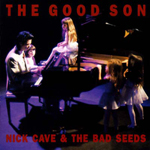 The
music was changing. He was getting more songwriter-y – they
were more song-like. Although there was still an experimental
edge, the songs were a little more formed – I think because
he wrote them all on piano. He was going through a big change
at the time as well. And so that was really a great experience
being in Sao Paulo and being in Brazil. It was such a completely
different atmosphere than Berlin or London which was a kind of
cold and hard reality. And Brazil was beautiful and sunny and
the people were really nice. Even though there was a lot of poverty
and crime there, it still was OK with us. It was a good good good
time.
The
music was changing. He was getting more songwriter-y – they
were more song-like. Although there was still an experimental
edge, the songs were a little more formed – I think because
he wrote them all on piano. He was going through a big change
at the time as well. And so that was really a great experience
being in Sao Paulo and being in Brazil. It was such a completely
different atmosphere than Berlin or London which was a kind of
cold and hard reality. And Brazil was beautiful and sunny and
the people were really nice. Even though there was a lot of poverty
and crime there, it still was OK with us. It was a good good good
time. 